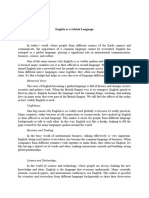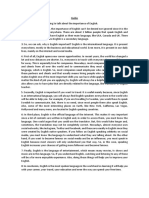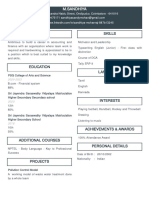English is the language of science, aviation, computers, diplomacy, and
tourism. It is the language of international communication, the media and
internet. Whether it’s for professional or personal reasons, understanding the
importance of English will help you reach your goals.
So, our topic today is
"The Importance of English in Today's World"
**Person A:**
Good afternoon everyone. It's great to see so many of you here today. My
name is [Your Name], and I'm here with [Partner's Name] to talk about
something that touches almost every aspect of our lives—the English
language. English is not just a language; it's a bridge, a tool, and a crucial
part of the global community.
Have you ever wondered about our condition if there was no common
language like English to share our thoughts and feelings with one another?
There are numerous languages in our world. Most countries have a national
language, and there are multiple regional languages within a nation. The
English language is a great boon in such situations; it serves as a common
language and helps everyone to communicate.
**Person A:**
To begin with, let's consider the global reach of English. English is the third
most spoken native language in the world, following Mandarin and Spanish.
However, if we consider non-native speakers, it becomes clear why English
is indispensable. Across continents, English serves as a common language,
facilitating communication in international business, travel, and academia.
**Person A:**
On the academic front, English holds immense importance as well. Consider
the vast majority of research papers and scholarly articles that are published
in English. Universities around the world offer programs taught in this
language, attracting international students seeking quality education. English
proficiency can provide access to some of the best educational resources
worldwide.
�**Person A:**
Let's not forget cultural influences, either. English is the language
dominating the entertainment industry, including movies, music, and
literature. It allows for broader cultural exchanges and helps us better
understand different cultures. By speaking English, we're better equipped to
engage with diverse global narratives.
**Person A:**
Moreover, English holds a unique position in diplomatic and international
organizations, such as the United Nations and the European Union. It
facilitates international dialogue and negotiation and is essential for
maintaining strong diplomatic relationships and fostering global peace and
cooperation.
**Person A:**
In closing, the importance of English cannot be understated. This powerful
medium of communication transcends borders and becomes a catalyst for
growth and connection. However, it's essential to balance its advantages
with an appreciation for linguistic diversity.
**Both**
Like the words of Frank Smith, “One language sets you in a corridor for life.
Two languages open every door along the way”. Let’s try to learn more
languages and open every opportunity in our lives.
We encourage you all to embrace the language while celebrating the unique
linguistic tapestry that each of us brings to the global community. Thank
you!
�**Person B:**
Absolutely, [Person A]. As we can see in the video, Jack Ma may be one of
China’s biggest success stories now – but he started from humble
beginnings. Travelling, seeing his own country and culture from a different
perspective as well as learning English played an essential part in his
success.
English has earned its place as the lingua franca of our time. Irrespective of
the corner of the globe you hail from, knowing English can open doors, both
personally and professionally. But why is this so? Let's delve into this
fascinating topic together.
**Person B:**
That's a good point, [Person A]. In today's interconnected world, businesses
often operate across multiple countries. English acts as a standard language
that makes it easier for collaboration and partnership. It's the language of
international trade and commerce. Given this dynamic, fluency in English is
no longer just an asset but often a requirement.
**Person B:**
Furthermore, English is vital in the digital era. Most content on the internet
is in English. Whether we're browsing for information, connecting with
people on social media, or watching online videos, English emerges as the
predominant language. Being able to understand and communicate in
English means having access to a wealth of knowledge and entertainment.
**Person B:**
Certainly! Also, let's reflect on the personal growth aspects. Learning
English can enhance cognitive skills like memory, problem-solving, and
critical thinking. For many people worldwide, achieving fluency in English
boosts self-confidence and provides a sense of personal accomplishment.
**Person B:**
Before we conclude, let's touch upon the challenges. While the spread of
English presents opportunities, it's important to recognize the linguistic
diversity it can sometimes overshadow. We should encourage learning
English, but not at the expense of diluting the richness of our native
languages and cultures.
�**Person B:**
The worldwide reach of the English language is the main reason for setting
English as the language of the internet. By knowing the English language, a
person can easily access all the information on any topics that are available
on the internet. English content like songs, movies, news, entertaining
programmes, public events, and all can be enjoyed by everyone who knows
the language.
**Both**
Like the words of Frank Smith, “One language sets you in a corridor for life.
Two languages open every door along the way”. Let’s try to learn more
languages and open every opportunity in our lives.
We encourage you all to embrace the language while celebrating the unique
linguistic tapestry that each of us brings to the global community. Thank
you!




























































































